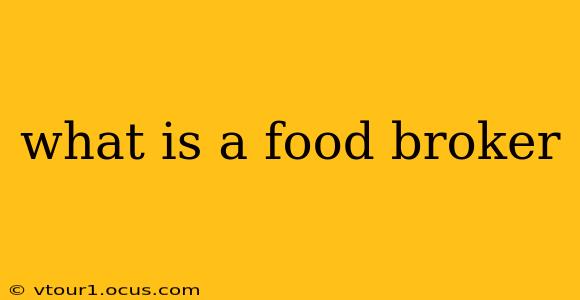The food industry is a complex web of producers, processors, distributors, and retailers. Within this network, a crucial, often overlooked, role is played by the food broker. But what exactly is a food broker? Simply put, a food broker acts as a liaison between food manufacturers and buyers, connecting producers with businesses that want to sell their products. They're essentially the matchmakers of the food world, facilitating sales and helping both sides of the transaction thrive. This detailed guide will explore their functions, benefits, and how they differ from other food industry professionals.
What Does a Food Broker Do?
Food brokers are independent sales representatives who don't own the products they sell. Their primary function is to find buyers for food manufacturers' products. They achieve this through a multifaceted approach, including:
- Identifying Potential Buyers: Brokers leverage their extensive networks of contacts within the food industry to identify potential buyers, such as grocery stores, restaurants, wholesalers, and food service distributors.
- Negotiating Sales: They negotiate the terms of sale between manufacturers and buyers, focusing on price, volume, delivery, and payment terms. This ensures a mutually beneficial agreement.
- Managing Sales Processes: This includes handling orders, tracking shipments, and addressing any issues that arise throughout the sales process. They act as a central point of contact.
- Market Research and Analysis: Successful food brokers stay updated on market trends, consumer preferences, and competitor activities. This helps them strategically position their clients' products and identify lucrative opportunities.
- Building Relationships: Strong relationships with both manufacturers and buyers are fundamental to a food broker's success. They cultivate these connections to secure ongoing sales and expand their client base.
How Do Food Brokers Get Paid?
Unlike employees, food brokers don't receive a salary. Instead, they earn a commission based on the sales they generate. This commission is typically a percentage of the total value of the sales they broker. This commission-based structure incentivizes brokers to focus on securing profitable deals for their clients.
What is the Difference Between a Food Broker and a Food Distributor?
While both food brokers and distributors play vital roles in the food supply chain, their functions differ significantly. Food distributors purchase products from manufacturers and then resell them to buyers, taking ownership of the goods. They handle inventory, warehousing, and logistics. Food brokers, on the other hand, act solely as sales representatives, never owning the products they sell. They focus on connecting buyers and sellers, facilitating the sale, and earning a commission in the process.
What are the Benefits of Using a Food Broker?
For food manufacturers, using a food broker offers several advantages:
- Expanded Market Reach: Brokers possess a vast network of potential buyers, expanding a manufacturer's market reach beyond their current capabilities.
- Reduced Sales Costs: Using a broker eliminates the need for a company to build and maintain its own sales force.
- Specialized Expertise: Brokers bring industry-specific knowledge and expertise, helping manufacturers navigate complex sales processes.
- Increased Sales Volume: Brokers' efforts contribute to a significant increase in sales volume for their clients.
How Do I Find a Food Broker?
Finding the right food broker requires careful research. Online directories, industry events, and referrals from other businesses in the food industry are valuable resources. Consider factors like experience, specialization, and client testimonials when making your decision.
Are Food Brokers Regulated?
The regulatory landscape for food brokers varies depending on location. While not all brokers require licensing, it's essential for them to adhere to relevant regulations and ethical business practices to maintain trust and credibility within the industry.
This comprehensive guide provides a solid understanding of the role and function of a food broker within the food industry. Their contribution to connecting manufacturers and buyers is invaluable, driving efficiency and growth in the food supply chain.
